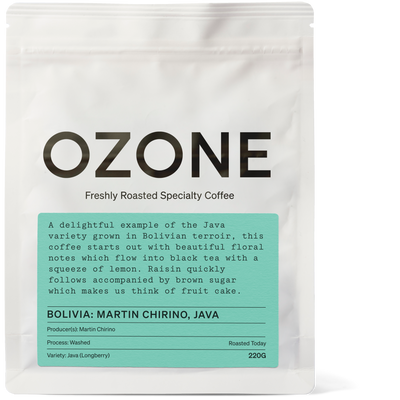The Trapiche farm is another venture by our friends at Agricafe in the Samaipata region of Bolivia. Pedro Rodriguez and his family also own a handful of other farms in the area: Floripondio, El Fuerte and Samaichacha and a whole host of other farms further afield in Bolivia, such as La Linda and Alasitas, that a lot of you will also be familiar with.
Trapiche's name was inspired by a vineyard of the same name in Argentina that Pedro visited before setting up this new farm in 2016. He and his family love good wine and have drawn on this when developing the design for this land. The word “Trapiche” originally refers to a type of mill made of wooden rollers used to extract juice from fruit such as grapes or olives.
The Rodriguez family are continuously looking for inspiration from other coffee-producing countries and from other industries such as winemaking – Trapiche is an example of this winery inspiration in action. The farm is a truly amazing place and the team have designed it to look and function like a vineyard, using those methodologies to refine their coffee production process. This is particularly fitting as Samaipata is an up and coming wine region within Bolivia, with several small vineyards located only a short distance from Trapiche.
The farm has only been operational since 2016 so it's still very young but the results from the first few harvests are very exciting. Samaipata isn't a traditional coffee growing region but it's one that the Rodriguez family have pioneered. The climate of the Samaipata region is temperate, semi-dry in the winter months, and mild with an average annual temperature of 19.9°C. During the winter months, cold fronts called Surazos come from the Argentine Pampas and enter the plains and valleys of Santa Cruz, these cold winds combined with the altitude can reach temperatures below freezing. In the summer the days are warm and the nights cool, this variation in diurnal temperature causes the cherries to take a longer time to ripen and their mucilage becomes very thick. The local soil contains a lot of magnesium, which is great for growing coffee and means that the coffee plants are less susceptible to roja, or other fungi. All of these factors contribute to a very unique taste profile.
The Rodriguez family are superstars in the world of Bolivian coffee, we think it's fair to say that the landscape of Bolivian coffee production would look a lot different without Agricafe's phenomenal work. Agricafe initially entered the coffee industry in 1986, when Pedro Rodriguez decided to pursue his passion for agriculture. Now they produce coffee from their own farms in the La Paz and Santa Cruz departments, source high-quality micro-lots from small local producers, and carry out the processing of everything at their state of the art mills. The steady decline of coffee production in Bolivia has put the sustainability of the family's business in jeopardy. Without the intervention of people like the Rodriguez family, the future of coffee production in Bolivia is at risk of disappearing. It's an expensive place to grow coffee, which means that the specialty market is the only sustainable model – higher quality means that producers can demand higher prices for their harvest. Alongside the exceptional work at their own farms and mills the Rodriguez family run the Sol De La Manana project, which seeks to educate local producers by providing agronomical expertise to improve the quality of their farms, and the Qhatu Café program which sources from small Organic producers to assure them a market for their coffee. In their own words, “In line with our values, it is very important to us to improve Bolivian Coffee culture and to diversify Bolivian coffees. Therefore, we believe we have to work together as a team with local producers of the regions where we produce. We aim for a sustainable coffee production in the long term, and this is why we decided to found two social programs in the area of Caranavi, supporting over 500 families in the region.”









